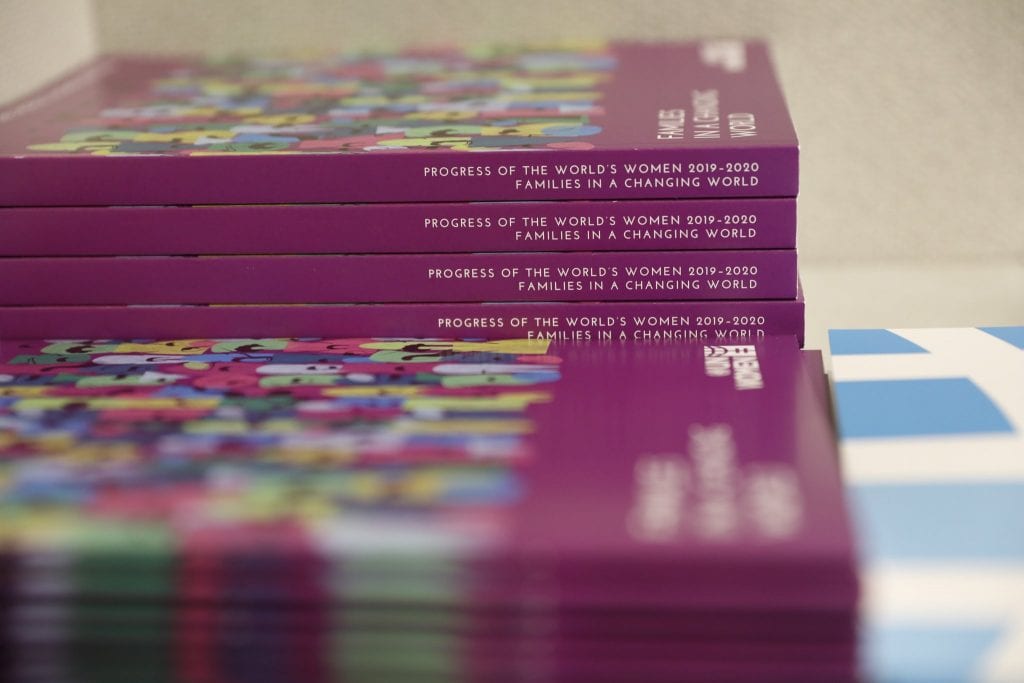UN Women released its flagship report Progress of the World’s Women 2019-2020: Families in a Changing World on Tuesday. It indicates that families can be ‘make or break’ for women when it comes to equality.
“Around the world, we are witnessing concerted efforts to deny women’s agency and their right to make their own decisions in the name of protecting ‘family values’. Yet, we know through research and evidence that there is no ‘standard’ form of family, nor has there ever been,” said UN Women Executive Director, Phumzile Mlambo-Ngcuka.
“This report counters that pushback by showing that families, in all their diversity, can be critical drivers of gender equality, provided decision-makers deliver policies rooted in the reality of how people live today, with women’s rights at their core.”
Gender inequality in family relationships means that women often have to bargain for their fair share. It’s on all of us to ensure that #FamiliesOfToday enable women & girls to realize their full potential: https://t.co/GCagSQBq9P #WomensProgress2019 pic.twitter.com/eszAkuzvk6
— UN Women (@UN_Women) June 25, 2019
According to the report, three billion women live in places where rape in marriages are not criminalised.
One in five countries have different inheritance laws for men and women and in 19 countries, it is law for women to obey their husbands.
Approximately one third of married women in developing countries report having little or no say over decisions regarding their own healthcare.
New data in the report shows that married women, especially those with children, have lower workforce participation rates, a reality that goes hand in hand with decreased income and benefits. Just over half of married women aged 25-54 are in the workforce, compared to 96 per cent of married men.
The major driver of these inequalities is the fact that women continue to do three times as much unpaid care and work than men, especially in the absence of affordable care services.
Paid parental leave and state support for childcare are some of the primary recommendations put forth by the UN in the report.
We at @UN_Women are pleased to announce the release of our flagship report: #WomensProgress2019
How can laws, policies and public action support #FamiliesOfToday in ways that enable gender equality and women’s empowerment? https://t.co/qKak5GxBzd pic.twitter.com/VT8QKjBpwa
— Phumzile Mlambo (@phumzileunwomen) June 25, 2019
On a more positive note, the report does indicate that more fathers are taking up parental leave. This is particularly true in countries where specific incentives are in place that reserve a portion of leave for fathers on a non-transferable, ‘use it or lose it’ basis.
A costing analysis included in the report finds that most countries are in a financial position to implement and prioritise a package of family-friendly policies, for less than 5 per cent of GDP.
Some of the recommendations put forth by the report to achieve greater equality for women include:
- Amending and reforming family laws to ensure that women can choose whether, when and who to marry; that provide the possibility of divorce if needed; and enable women’s access to family resources.
- Recognizing diverse partnership forms, to protect women’s rights in both cohabiting and same sex partnerships.
- Investing in public services, especially education and reproductive healthcare, so that women’s and girls’ life choices are expanded, and they can make informed choices about sex and childbearing.
- Paid parental leave, and State support for the care of children and older persons, must be considered in crafting comprehensive social protection systems that can help to sustain families.
- Ensuring women’s physical safety by implementing laws and policies to eliminate all forms of violence against women and girls and providing access to justice and support services for survivors of violence.
“The report calls on policymakers, activists and people in all walks of life to transform families into places of equality and justice—where women can exercise choice and voice, and where they have physical safety and economic security,” said a statement issued by UN Women on Tuesday.


